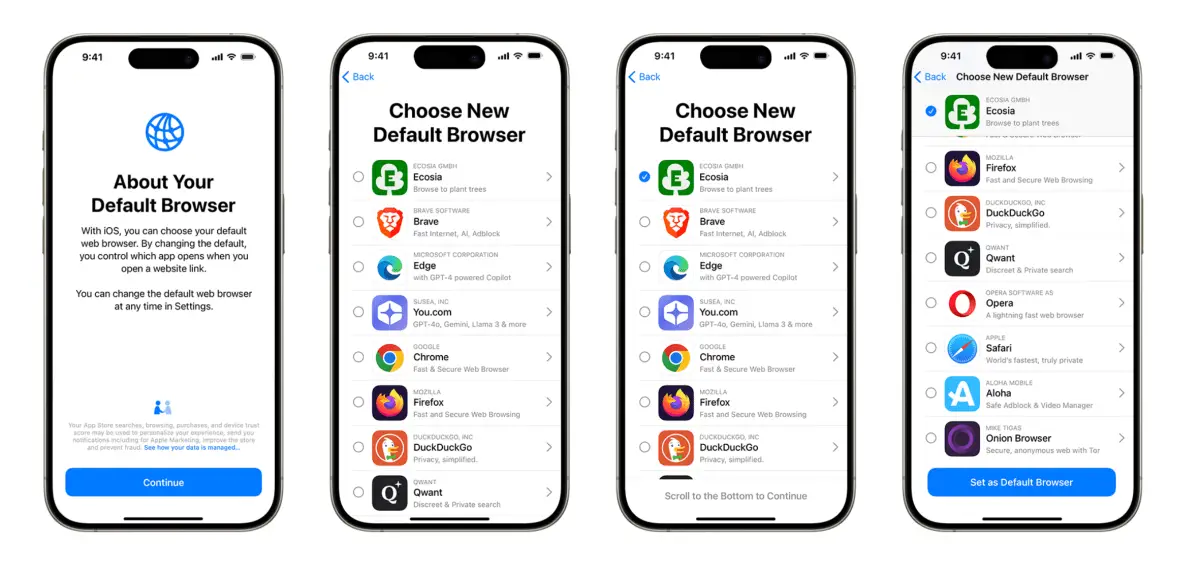Apple continues to adjust its approach to compliance with the European Union’s Digital Markets Act (DMA): Announcing another batch of changes Thursday, the iPhone maker showed off redesigned browser choice screens it said would be coming to iOS and iPadOS “later this year,” with version 18 of its mobile software platforms.
The tweaked browser choice screens will provide users with a toolbar on the left-hand side of the list where they can select a browser directly from the choice screen, which will then be pinned to the top of the list as they scroll through the full list of options.
In another change, users will be required to scroll through the full list of available browsers — but these will still be the top 12 browsers available in their country displayed in a random order. There will also be slightly more information displayed per browser — with Apple pulling in the app subtitle from the App Store product page.
Once the user confirms their selection if they have picked a default browser that’s already on their phone the app will open immediately and they will be shown a notification confirming it’s now their default. The browser’s app icon will also automatically replace Safari in the dock (if they had Safari in that slot).
If the user selects a default browser they don’t already have on their device it will automatically start downloading at the moment of confirmation — and, once the download is complete, it will open automatically with a confirmation notification it’s now the default.
Another, potentially bigger, change is that the choice screen will likely be displayed more often as Apple will show it on every device,where an iOS or iPadOS user has Safari as the default — rather than just once per user.
Currently, once a user has updated to iOS 17.4, the choice screen is only shown the first time the user opens Safari on their device. But once users update to iOS 18 — and if Safari is their default browser — they will be shown the choice screen again. If they migrate to a new device still with Safari as their default they’ll be served the choice again.
Additionally, Apple has announced changes to default apps for EU users, including a new centralized setting where they will be able to view a list of all the defaults available.
In further updates to its mobile platforms, the bulk of which are slated for later this year, Apple said it will expand the list to include new default settings for dialing phone numbers, sending messages, translating text, navigation, managing passwords, keyboards and call spam filters. (Defaults for navigation and translation apps are penciled in for spring 2025.)
Later this year Apple is also set to allow more of its default apps to be deletable by EU users — including the App Store, Messages, Photos, Camera and Safari.
It said users will be able to re-download any defaults they delete from the App Store or in the app installation section setting (in case, presumably they no longer have Apple’s store on their device).
The changes — the bulk of which are set to arrive later this year (though Apple wouldn’t be nailed down to an exact launch date) — look intended to respond to criticism its current browser choice screen design makes it too hard for users to switch away from its Safari browser and that it’s failing to meet broader user choice obligations under the DMA.
As a designated gatekeeper under the pan-EU regulation, Apple must open up its mobile ecosystem in a variety of ways the EU hopes will boost competition and consumer choice — under threat of stiff penalties (starting at up to 10% of global annual turnover) for non-compliance.
The bloc opened its first DMA investigations on Apple in March, which included scrutiny of its browser choice screen design and wider user choice obligations. Since then the European Commission, which enforces the DMA, has issued preliminary findings on another Apple probe — related to anti-steering rules on Apple’s App Store. But there’s been no public word on the choice obligation investigation.
Apple hopes this new bundle of changes will be sufficient to resolve the EU’s enforcement without the risk of a full-blown non-compliance finding (and the associated risk of a hefty fine).
The DMA gives the Commission leeway to accept remedies proposed by gatekeepers to resolve concerns without having to resort to its full enforcement toolbox as the bloc is keen for the regulation to deliver quick results.
Back in March when the Commission announced its first DMA probes on Apple, it said it was concerned about compliance with DMA obligations to “(i) enable end users to easily uninstall any software applications on iOS, (ii) easily change default settings on iOS and (iii) prompt users with choice screens which must effectively and easily allow them to select an alternative default service, such as a browser or search engine on their iPhones.”
“The Commission is concerned that Apple’s measures, including the design of the web browser choice screen, may be preventing users from truly exercising their choice of services within the Apple ecosystem, in contravention of Article 6(3) of the DMA,” it added at the time.
Since then the EU has designated iPadOS as another “core platform service” under the DMA — which is why Apple’s changes apply to both its mobile platforms.
Briefing journalists on its latest DMA tweaks, Apple said it believes the changes will address the EC’s concerns. It said it’s taken feedback from stakeholders and couched the iterative process as part of an ongoing compliance dialog.
Lea Zuber, a spokeswoman for the Commission, confirmed the EU’s choice obligation investigation is still open on Apple. “There are no remedies in the DMA but the gatekeepers and Commission are working together on compliance solutions,” she added.
Commenting on Apple’s announcements directly, the EU also told us the company needs to implement the changes which it emphasized it will monitor for effectiveness.
“Apple and the Commission have been engaging in a constructive dialogue on the implementation of Apple’s DMA obligations to enable end users to easily uninstall any software applications on iOS, easily change default settings on iOS and prompt users with a choice screen for browsers,” the EU said. “Apple now needs to implement the newly announced solutions in practice and continue engaging with the Commission.
“The Commission will monitor the effectiveness of the solutions in achieving the objective of the DMA and article 6(3) specifically. On that basis it will decide on the next steps in the open case,” it added.
This report was updated with the Commission’s response to Apple’s announcement



![i-can't-believe-i-slept-with-you-vol-1-[manga-review]](https://sharethelinks.com/wp-content/uploads/2024/08/200265-i-cant-believe-i-slept-with-you-vol-1-manga-review.jpg)
![sakamoto-days-volume-1-[manga-review]](https://sharethelinks.com/wp-content/uploads/2024/08/200269-sakamoto-days-volume-1-manga-review.jpg)
![the-transcendent-one-sided-love-of-yoshida-the-catch-vol.-1-[manga-review]](https://sharethelinks.com/wp-content/uploads/2024/08/200273-the-transcendent-one-sided-love-of-yoshida-the-catch-vol-1-manga-review.jpg)
![a-tale-of-the-secret-saint-volume-1-[manga-review]](https://sharethelinks.com/wp-content/uploads/2024/08/200276-a-tale-of-the-secret-saint-volume-1-manga-review.jpg)


